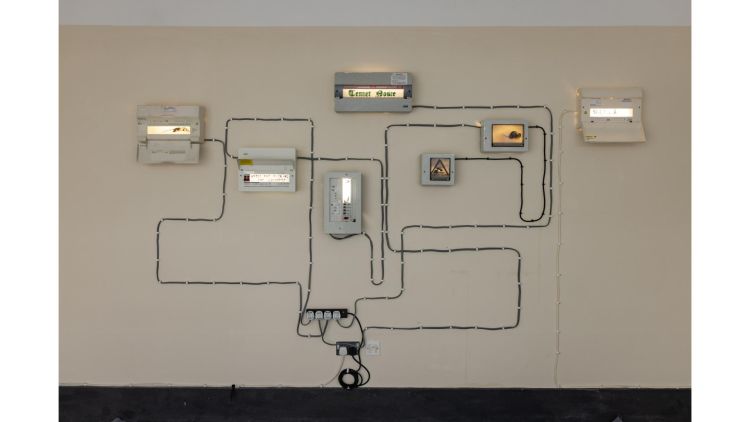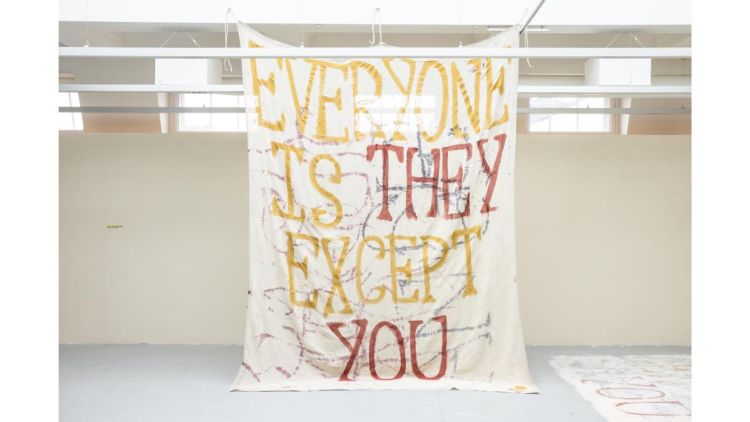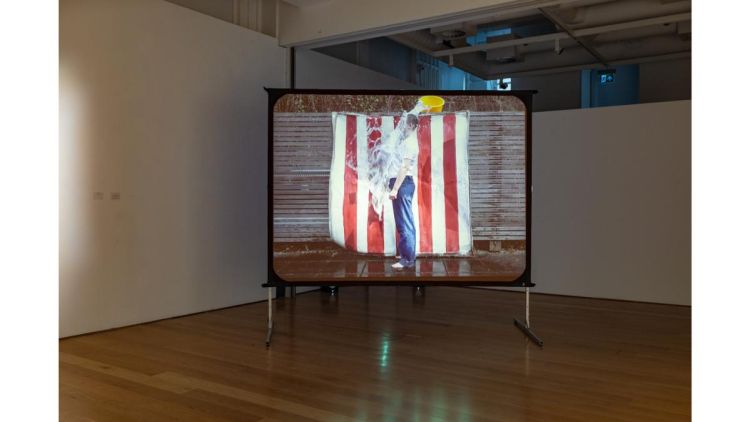
George Storm Fletcher
- Course: MA Fine Art
- Graduation: 2024
- Nationality: British
What made you want to apply to your course and to Leeds?
I undertook my BA at the school of Fine Art and felt like I had ‘unfinished business’ at the University of Leeds. I had formed friendships and professional working relationships that not only made learning and making work easier, but really enjoyable. I felt that moving away was at odds with how I wanted to live my life, I think investing in the place you live in, with your time and your energy, always pays off. If I had an idea, but I wasn’t sure how to make it happen, I knew who to talk to, where to make it, and where to find information to learn what I needed to get it done; these are things that only come with being in one space for an extended period of time.
What aspects of the course do you enjoy the most?
The studio culture of doing an art degree is by far the most important and enjoyable aspect of the course. Coming in and seeing what people are making, having conversations about your work; the ideas you are having, both preliminary and when in development are something that cannot be replicated digitally, or in solitary. I have formed friendships with my peers that I will cherish and sustain, as a result of working together.
At Masters level people have more complicated lives, some of my studio friends work during the week and are in at weekends, some work later or weekends like me; you all rub up against each other in a studio and interact in a way that means close bonds are formed quickly. You have to trust the people you are working with, and this is the aspect of the course I am really going to miss.
Can you talk about your practice now, and how the course / opportunities outside of it have helped you to develop?
Having the backing of a university when you are trying to make work is invaluable. For example, this year I have worked with Leeds Cultural Investment Fund on a film project called ‘HEAVEN’. Although this wasn’t formally a part of my course, I was able to use audio visual equipment from my school, which meant that instead of spending our budget on boring stuff, like renting equipment, I could use the money to buy an ISBN number to formally archive the artists book I am making about the project.
Furthermore, I have organised two off site exhibitions with my Masters group, both in first year and in second year. Although I used my own network to arrange this, the University paid for the space, and the technical team made sure we had everything we needed to install the show off campus – and troubleshoot problems with equipment, as they arose!
Putting on two external exhibitions, Traces V.2 (2023), and What’s in your Freezer? (2024), meant reaching an entirely new audience, connecting with people at Patrick Studios, part of East Street Arts, and seeing how as a studio, our work looked together – before the Degree show. It was also fun seeing how we fared with the stress of working together as quite a new group.
It is the people you meet that are what helps you develop; making art is a series of To Do List processes, that involve different skills and specialisms, and I couldn’t possibly learn them all myself, but can contact my speed dial of experts!

Have you worked closely with a particular tutor or member or the University’s academic staff?
I have worked with Dr. Eric Prenowitz on my written work on my degree, both opting to take his ‘Reading Sexual Difference’ module, and also working with him as my supervisor for my dissertation. We worked together during my BA at the school, so it was fortunate that I was able to carry on working with him.
Eric advocates for a precision in thinking that is found through writing – and this is something I really needed in my work. I have always enjoyed research and writing, but sometimes you need somebody to push you, and stop forgiving vagueness or holes in the thinking, in Eric I have found a teacher that encourages my ideas but makes sure I execute them in a way that does justice to the ideas and texts I am using. I hope we get to work together again.
What would you say about the learning facilities in your School and at the University in general?
I have spent so many hours in the basement at my school, I wouldn’t like to know how many days I have spent down there. There are computers with all the fancy software you need to be an artist, and I have, as a result become proficient in Adobe software like InDesign and Photoshop, for making exhibition posters, portfolios and books; and I have learnt how to use Premier Cut Pro, captioning my film HEAVEN myself. These are skills that mean when someone says, ‘can you remove the background from this for me,’ I can do it in about 10 minutes max, whereas others may have to pay someone to do it for them.
My building is 24/7 access with my keycard, which means If I want to come in at the weekends to use my studio or stay a bit later to finish something when it is going well, then I can.
The libraries also have very expansive opening times, I have never had my train of thought interrupted due to the opening hours of the facilities, which is a real blessing. Especially when balancing part time study and part time work, my working weeks don’t always look like the classic 9-5, Monday to Friday – and the 24/7 allowance provides space for students who are managing multiple lives at once.
It must be said that the facilities are brilliant, but they are even more brilliant because of the people that work in them. All the technicians in my school are artists in their own right, and work at the top of their fields. It is a real privilege to work with people as talented and great as all the technical team at Fine Art. I have learnt so many things I couldn’t possibly write it all down, but it has changed the way I operate at work, but also in the rest of my life. My whole attitude to precision, care and due diligence has changed – it really is transformational making things with other people.

What other activities are available for students to take part in outside of their studies and which ones have you tried out yourself?
To be honest, doing an art degree is such an all-encompassing thing, that my extracurricular time has also been art, and ‘FAHACS’ orientated. So, I have been involved in filming other people’s projects, and helping with the install process of friends’ shows. This becomes as much a social as a professional thing - it is fun working with others on bonkers ideas and becoming a temporary team to get things done before a deadline.
So, for example, I helped my course mate Astrid Butt film two shorter music videos for her Masters show, in the room above the Fenton Pub on Woodhouse Lane. We all wore animal masks and mimed along to two songs, like in the Robert Plant Addicted to Love music video. Although technically this counted as ‘work’, it felt more like ‘play’ at the time.
How do you think the skills and knowledge you’ve developed at Leeds will help with your career plans?
An art career, especially one as a practicing artist is a complicated thing now. My course has been entirely self-led, with a series of milestones to reach along the way. So, I suppose from this point of view, I am used to setting my own deadlines, deciding what work I want to make, to what standard, and organising the funding/practical elements myself, is something I am entirely used to. I have been my own publicist, project manager, HR department and technician for 6 years now, at the University, so moving into a world where I have to be self-sustaining doesn’t feel like such a shock. These are the ‘soft skills’ art degrees teach you, I am unshockable, and very willing and happy to think on my feet, be adaptable and flexible!

What would you say to anyone thinking of applying to your course?
The last two years here have been invaluable to me, and I really needed the time and headspace set aside to make the work that I have made. But Masters of Art degrees are full-on, if you have a dedicated artistic practice, that is your personal obsession, and one that you feel deserves the attention that extra study will provide, then do it. But this isn’t a course for ‘people who make art’, it is a course for ‘artists’, and this is distinction that I really feel in the second year of my study, has become really evident.
It gives you the opportunity to take things you are already interested in, and blow them apart, and analyse them intricately – but nobody is going to tell you what that original interest or motivation should be, or is; it’s OK to take a few years to work out what that is, before doing a Masters, and I think this would mean getting the most out of the time.
Read about Masters courses at the School of Fine Art, History of Art and Cultural Studies

